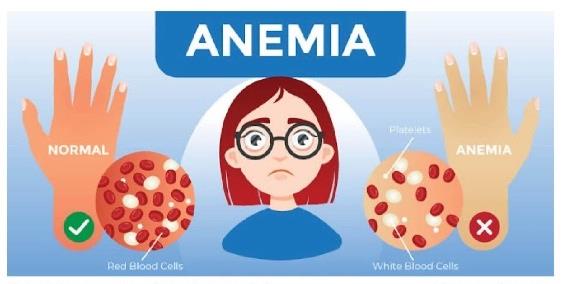
Anaemia Is More Than Fatigue
ADVERTISEMENT
The most common type of anaemia in young women is iron-deficiency anaemia , which arises when the body lacks sufficient iron to produce adequate haemoglobin. This can result from:
. Heavy menstrual bleeding : Prolonged or heavy periods can lead to substantial blood loss, depleting iron stores.
Read Also Nearly 6 In 10 Female Teens Anaemic In India, Teenage Motherhood An Important Risk Factor: Study. Poor dietary intake : A diet low in iron-rich foods such as red meat, leafy greens, and fortified cereals contributes to anaemia.
. Malabsorption issues : Conditions like celiac disease or inflammatory bowel disease may impair iron absorption.
. Chronic diseases : Disorders such as chronic kidney disease or autoimmune diseases can also contribute to anaemia.
Anaemia and Fertility: The Connection
Anaemia can impact fertility in several ways, creating challenges for women trying to conceive:
1. Hormonal Imbalances
Iron is essential for the production of healthy eggs and the regulation of ovulation. Chronic anaemia can disrupt hormonal pathways, potentially leading to irregular menstrual cycles or anovulation (lack of ovulation), which are primary causes of infertility.
2. Impaired Endometrial Health
A healthy uterine lining, or endometrium, is crucial for implantation of the fertilized egg. Anaemia, by reducing oxygen supply to tissues, can compromise the growth and quality of the endometrial lining, making implantation more difficult.
3. Increased Risk of Pregnancy Complications
Women with anaemia face a higher risk of miscarriage, preterm birth, and low birth weight. These complications not only affect pregnancy outcomes but can also delay conception due to recurrent pregnancy losses.
Preventing and Managing Anaemia to Support Fertility
To mitigate the effects of anaemia on fertility, young women should prioritize prevention and management strategies:
1. Adopt a Balanced Diet
Incorporate iron-rich foods such as lean meats, spinach, legumes, and fortified cereals. Pair these with vitamin C sources like citrus fruits to enhance iron absorption.
2. Take Iron Supplements if Needed
Women diagnosed with iron-deficiency anaemia may benefit from prescribed iron supplements. It's important to take them under medical guidance to avoid side effects like gastrointestinal discomfort.
3. Monitor Menstrual Health
Address heavy menstrual bleeding through medical consultation and explore treatments such as hormonal therapies if necessary.
4. Check for Underlying Conditions
Treating conditions like hypothyroidism, celiac disease, or chronic inflammation is essential to resolving secondary anaemia and restoring fertility.
5. Preconception Care
Women planning to conceive should undergo a thorough health assessment, including blood tests to check iron levels and overall reproductive health.
Anaemia in young women is more than a transient health issue-it has profound implications for fertility and reproductive outcomes. By recognizing the signs of anaemia early and taking proactive steps to address its root causes, women can not only improve their overall health but also enhance their chances of a healthy conception and pregnancy. Raising awareness about this connection is essential to empowering women to make informed decisions about their health and well-being. Prioritize your health today for a brighter tomorrow.
- The author is a part of Alamdar Memorial College of Nursing and Medical Technology, Chrar i Shareef , Budgam
Follow this link to join our WhatsApp group : Join Now
| Be Part of Quality Journalism |
| Quality journalism takes a lot of time, money and hard work to produce and despite all the hardships we still do it. Our reporters and editors are working overtime in Kashmir and beyond to cover what you care about, break big stories, and expose injustices that can change lives. Today more people are reading Kashmir Observer than ever, but only a handful are paying while advertising revenues are falling fast. |
| ACT NOW |
| MONTHLY | Rs 100 | |
| YEARLY | Rs 1000 | |
| LIFETIME | Rs 10000 | |
CLICK FOR DETAILS

Legal Disclaimer:
MENAFN provides the information “as is” without warranty of any kind. We do not accept any responsibility or liability for the accuracy, content, images, videos, licenses, completeness, legality, or reliability of the information contained in this article. If you have any complaints or copyright issues related to this article, kindly contact the provider above.






















Comments
No comment